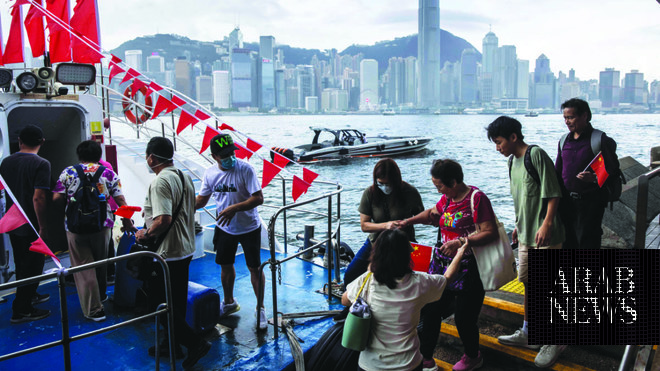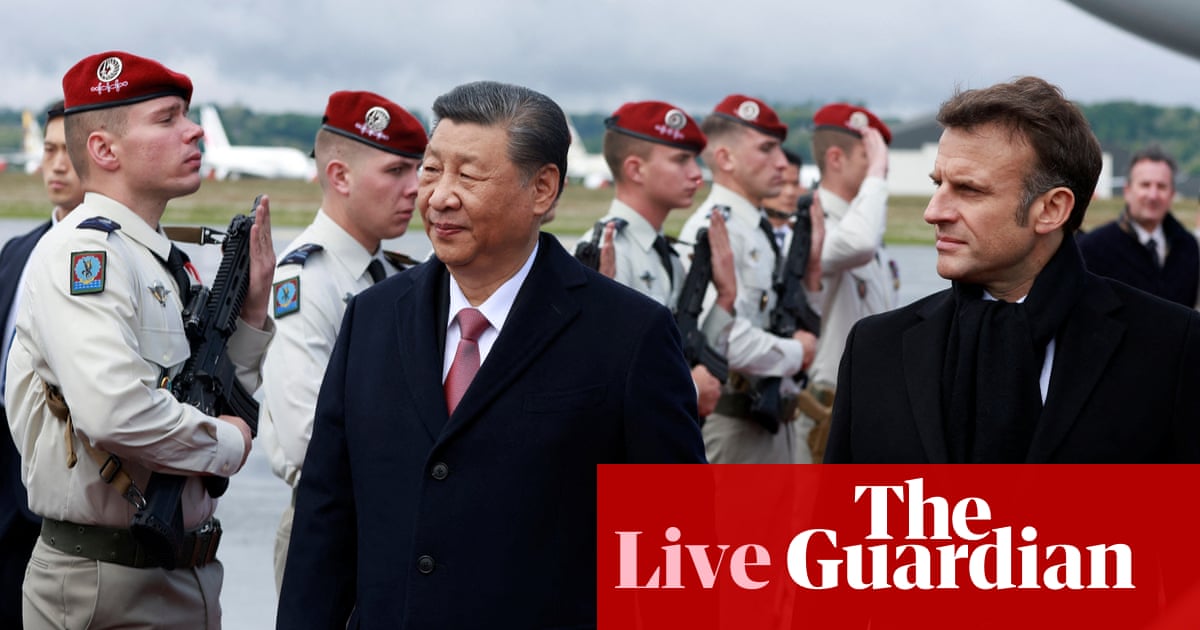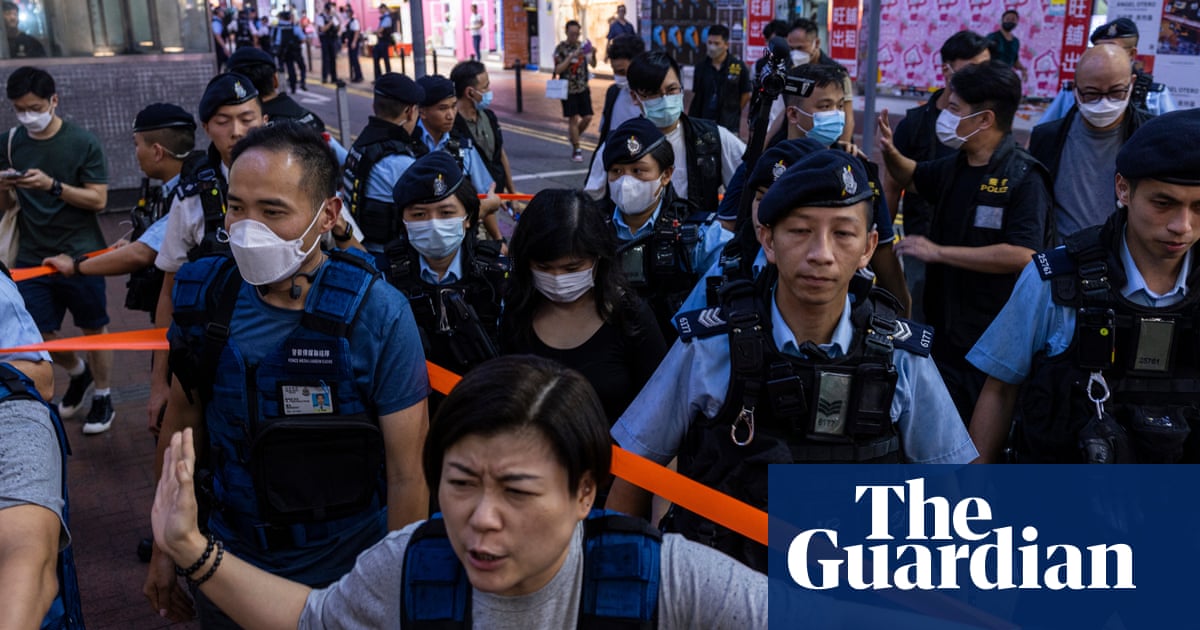
Xi Jinping has hailed China’s rule over Hong Kong as he led 25th anniversary celebrations of the city’s handover from Britain, insisting democracy was flourishing despite a political crackdown that has silenced dissent.
After swearing in a new hardline chief executive, John Lee, in a solemn ceremony on Friday morning, the Chinese president laid out his vision for the city and its administrators.
On his first trip outside mainland China since the pandemic began, he vowed that “one country, two systems” – a governance model under which Hong Kong was promised it would retain some autonomy and freedoms for 50 years – would endure.
Lydia Dunn and SY Chung talk to reporters in 1984
The Hong Kong ‘unofficials’ who advised Britain on the handover – and were ignored
Read more
Advertisement
“For this kind of good system, there is no reason to change it, it must be upheld for the long term,” Xi said, as critics questioned whether the city’s high level of autonomy was still intact.
“After much turmoil, people have learned a painful lesson that Hong Kong cannot be disorderly, it cannot afford to be,” he said. “Hong Kong is in a new phase from disorder to stability, from stability to prosperity”.
The past three years have seen an unprecedented unpicking of freedoms in Hong Kong as a result of the Beijing-imposed national security law. Scores of pro-democracy activists, journalists and opposition politicians have been jailed.
Xi called on Hong Kong’s residents to contribute to the “great rejuvenation of the Chinese nation” and insisted Beijing had always acted “for the good of Hong Kong”.
Lee, himself a former security minister, named key protests in the pro-democracy movement as challenges the city had overcome, while Xi said the introduction of national security legislation and its revamped “patriots-only” electoral system safeguarded Hong Kong people’s democratic rights.
At the swearing-in ceremonies, all officials, including Xi, wore masks and stood at least one metre apart. They did not shake hands. Xi will return to mainland China on Friday afternoon, after having stayed less than 24 hours.
A police checkpoint outside the West Kowloon high-speed rail station before Xi Jinping’s arrival
A police checkpoint outside the West Kowloon high-speed rail station before Xi Jinping’s arrival. Photograph: Anthony Kwan/Getty Images
Advertisement
Before the highly choreographed ceremony began, the British prime minister, Boris Johnson, and the US secretary of state, Antony Blinken, said Beijing had failed to respect the “one country, two systems” arrangement agreed under the deal that ended British colonial rule in 1997.
Vowing not to “give up” on Hong Kong, Johnson said: “It’s a state of affairs that threatens both the rights and freedoms of Hongkongers and the continued progress and prosperity of their home.”
Blinken said Friday was supposed to be the halfway mark of 50 years of promised autonomy under one country, two systems, “yet it is now evident that Hong Kong and Beijing authorities no longer view democratic participation, fundamental freedoms, and an independent media as part of this vision”.
Saying a strict security law imposed in Hong Kong by Beijing in 2020 had led to an “erosion of autonomy”, he said: “We stand in solidarity with people in Hong Kong and reinforce their calls for their promised freedoms to be reinstated.”
A couple in Hong Kong at an exhibition to mark the 25th anniversary of the former British colony’s return to Chinese rule
A couple in Hong Kong at an exhibition to mark the 25th anniversary of the former British colony’s return to Chinese rule Photograph: Kin Cheung/AP
Events to mark the anniversary of the handover began with a brief flag-raising ceremony at the Hong Kong convention and exhibition centre, a venue surrounded by huge police barricades. Previously, Hong Kong activists have rallied outside the ceremony but were warned by national security police not to protest this year.
Security was tight across the city. Hong Kong police’s counter-terrorism response unit was deployed in Wan Chai, accompanied by armoured vehicles.
Advertisement
Officers also patrolled the area and conducted vehicle spot checks. Media personnel had to surrender their umbrellas before entering the events, as well as having their belongings searched and inspected. The item has been a symbol of the pro-democracy movement since 2014.
Sign up to First Edition, our free daily newsletter – every weekday morning at 7am BST
Meanwhile, members of the League of Social Democrats, an activist group, were told by police not to stage any protest on 1 July, after members were interviewed and had their homes searched.
The league’s former chairman Avery Ng, said he spotted a team of plainclothes police outside his building, comparing the situation to a house arrest. “Obviously, this is very similar to what happens on the mainland, on significant days you will be ‘invited’ to keep quiet, or perhaps ‘invited’ to go on a trip,” Ng said.
Unprecedented scrutiny was also applied to journalists covering 1 July events. Only media selected by the government could physically attend the events. The Hong Kong Journalists Association said about 10 media workers from various outlets, including the South China Morning Post, were barred from the events due to “security reasons”.
During the inauguration ceremony both Xi and Lee stressed the need for Hong Kong to attract foreign capital.
On Thursday, Xi told selected crowds in Hong Kong that the region had “risen from the ashes”.
Xi looks on as John Lee is sworn in as Hong Kong’s leader.
Xi (right) looks on as John Lee is sworn in as Hong Kong’s leader. Photograph: Reuters
Advertisement
“My heart and that of the central government have been with our compatriots in Hong Kong,” he said, according to a translation by the South China Morning Post. “In the past few years, Hong Kong has gone through various severe challenges one after another, and has defeated them.
“After the wind and rain, Hong Kong has risen from the ashes, and showed strong vibrancy.”
Lee has pledged to unite the city for “a new chapter”, while also promising an even more aggressive approach to counter “fearmongering and badmouthing” by critics.
Xi Jinping arrives in Hong Kong
Hong Kong tightens security as Xi visits for 25th anniversary of handover
Read more
Before Friday’s events, Johnson said he would seek to continue to hold China to its commitments under the one country, two systems model, so that Hong Kong is “once again run by the people of Hong Kong, for the people of Hong Kong”. He said Britain’s immigration route for holders of British national (overseas) passports last year had attracted 120,000 applications.
The British foreign secretary, Liz Truss, echoed Johnson’s comments, and said: “Authorities have stifled opposition, criminalised dissent and driven out anyone who can speak truth to power.
“The United Kingdom’s historic commitment to Hong Kong and its people endures. That is why we continue to challenge China for breaching the legally binding commitments it signed up to under the joint declaration.”
Australia also criticised China for restricting the rights and freedoms of people in Hong Kong. “Australia remains deeply concerned by the continuing erosion of Hong Kong’s rights, freedoms and autonomy, two years since the imposition of the national security law,” the foreign minister, Penny Wong, said.
Congratulations on being one of our top readers globally – you"ve read 119 articles in the last year
Article count
on
Boris Johnson is somehow clinging to power despite a mutiny by his own MPs over the Partygate affair.
The entire debacle is a perfect example of why we need rigorous, independent journalism. Without media scrutiny from the Guardian and our peers, we wouldn’t know that Johnson had broken the law while in office. There would have been no police fines, no independent investigation. We would be none the wiser.
This is holding power to account, the most important task of journalists in an age of dishonesty and misinformation. Ever since Johnson became prime minister, Guardian journalists have worked tirelessly to reveal the shortcomings of his government: the Covid blunders, the insider contracts, the hypocrisy - of those who broke their own rules, partying or travelling when they shouldn’t have.
Our editorial independence means we are free to expose the failings of the powerful people who lead us in these troubled times. We have no shareholders and no billionaire owner, just the determination and passion to deliver high-impact global reporting, free from commercial or political influence. Reporting like this is vital for democracy, for fairness and to demand better from leadership.
And we provide all this for free, for everyone to read. We do this because we believe in information equality. Greater numbers of people can keep track of the events shaping our world, understand their impact on people and communities, and become inspired to take meaningful action. Millions can benefit from open access to quality, truthful news, regardless of their ability to pay for it.
Since we started publishing 200 years ago, tens of millions have placed their trust in the Guardian’s fearless journalism, turning to us in moments of crisis, uncertainty, solidarity and hope. More than 1.5 million supporters, from 180 countries, now power us financially – keeping us open to all, and fiercely independent.
Every contribution, however big or small, powers our journalism and sustains our future. Support the Guardian from as little as $1 – it only takes a minute. If you can, please consider supporting us with a regular amount each month. Thank you.
Contribution frequency
Single
Monthly
Annual
Contribution amount
$5 per month
$10 per month
Other












